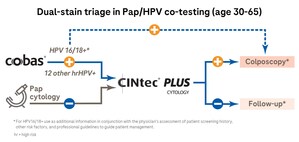NT-proBNP Guided Therapy Keeps Heart Failure Patients out of the Hospital Through a Reduction in Cardiovascular Events
At this year's congress of the American Heart Association (AHA) in Chicago, November 13-17, new data on the use of NT-proBNP to guide heart failure therapy was presented by study investigators from Harvard University and Massachusetts General Hospital
The positive results promote a new paradigm in the management of heart failure
INDIANAPOLIS, Nov. 15, 2010 /PRNewswire-FirstCall/ -- Roche (SIX: RO, ROG; OTCQX: RHHBY) and study investigators from Harvard University and Massachusetts General Hospital announced today that in the PROTECT (Pro-BNP Outpatient Tailored Chronic HF Therapy) trial, a strategy of NT-proBNP guided heart failure care was independently associated with a significant reduction in total cardiovascular events, the primary composite endpoint of the study, which included worsening heart failure, heart failure hospitalization and cardiovascular related death.
"The data of the study indicates a significant difference between the treatment arms in favor of the NT-proBNP group", the principal investigator Dr James Januzzi, associate professor of medicine at Harvard Medical School and director of the Cardiac Intensive Care Unit at the Massachusetts General Hospital, said in his talk. "We are excited to see that following the interim results, the full results of the trial support the concept of biomarker-guided heart failure care."
In the PROTECT study, patients with chronic systolic heart failure (left ventricular ejection fraction <40%) were randomized to one of two treatment approaches: a standard-of-care arm, where patients received aggressive guideline-compliant heart failure care, or an NT-proBNP arm, where patients were treated with similar aggressive clinical care, but with a simultaneous goal to decrease and maintain NT-proBNP concentrations below 1,000 pg/mL, a value which previous studies have shown the cardiovascular event risk in heart failure to be considerably lower.(1)
"While previous studies have returned mixed results with respect to the approach of "guided therapy" with natriuretic peptide testing, the reduction in total cardiovascular events in the NT-proBNP arm suggests the important role of this cardiac hormone in the management of heart failure," Dr. Januzzi said.
Heart failure – a global burden
It is estimated that as many as five million Americans have heart failure, with 400,000-500,000 new cases/year; the diagnosis carries a mortality rate that exceeds many cancers. Heart failure ranks among the most costly chronic conditions in developed countries, with the burden being greatest among the elderly. Heart failure hospitalization represents a major burden on the healthcare system both in the U.S. and the rest of the world.
Given this rapidly increasing incidence of heart failure and relative shortage of novel therapies for diagnosis, a new strategy of care utilizing existing therapies, including the intention to not only address symptoms, but also to lower NT-proBNP concentrations with the goal of reducing risk in parallel, would not only contribute to better patient outcomes, but also likely reduce healthcare costs.
About the Roche sponsored PROTECT study
PROTECT, a prospective randomized trial comparing a strategy of aggressive heart failure therapy guided by levels of a cardiac hormone—amino-terminal pro-B type natriuretic peptide (NT-proBNP)—versus standard heart failure treatment without NT-proBNP guidance has been enrolling subjects in the Heart Center at the Massachusetts General Hospital since 2006. In December 2009 the promising results of the interim analysis supported the early closure of the study.
Besides the primary endpoint of total cardiovascular events over a one year period, other endpoints in PROTECT will include effects of NT-proBNP guidance on quality of life, effect of NT-proBNP guided care on cardiac structure and function, and overall costs of care. Publication of the results is expected in the next few months.
About NT-proBNP
Tests for NT-proBNP, a cardiac hormone that is released into the blood when the heart wall is stretched, are developed and marketed by Roche. NT-proBNP was approved by the U.S. Food and Drug Administration (FDA) as an objective marker for the aid in diagnosis in individuals suspected of having congestive heart failure. The test is further indicated for the risk stratification of patients with acute coronary syndrome and congestive heart failure and aid in assessment of increased risk of cardiovascular events and mortality in patients at risk for heart failure who have stable coronary artery disease.
About Roche
Headquartered in Basel, Switzerland, Roche is a leader in research-focused healthcare with combined strengths in pharmaceuticals and diagnostics. Roche is the world's largest biotech company with truly differentiated medicines in oncology, virology, inflammation, metabolism and CNS. Roche is also the world leader in in-vitro diagnostics, tissue-based cancer diagnostics and a pioneer in diabetes management. Roche's personalized healthcare strategy aims at providing medicines and diagnostic tools that enable tangible improvements in the health, quality of life and survival of patients. In 2009, Roche had over 80,000 employees worldwide and invested almost 10 billion Swiss francs in R&D. The Group posted sales of 49.1 billion Swiss francs. Genentech, United States, is a wholly owned member of the Roche Group. Roche has a majority stake in Chugai Pharmaceutical, Japan. For more information: www.roche.com or www.roche-diagnostics.us.
(1) Masson S, Latini, R, Anand IS, et al. Prognostic Value of Changes in N-Terminal Pro-Brain Natriuretic Peptide in Val-HeFT (Valsartan Heart Failure Trial). J Am Coll of Cardiol 2008; 52: 997-1003.
All trademarks used or mentioned in this release are protected by law.
For further information, please contact: |
|
Betsy Cox |
|
Director, Corporate Communications |
|
Roche Diagnostics Corporation |
|
Indianapolis, IN |
|
(317) 521-3911 |
|
SOURCE Roche Diagnostics
WANT YOUR COMPANY'S NEWS FEATURED ON PRNEWSWIRE.COM?
Newsrooms &
Influencers
Digital Media
Outlets
Journalists
Opted In






Share this article